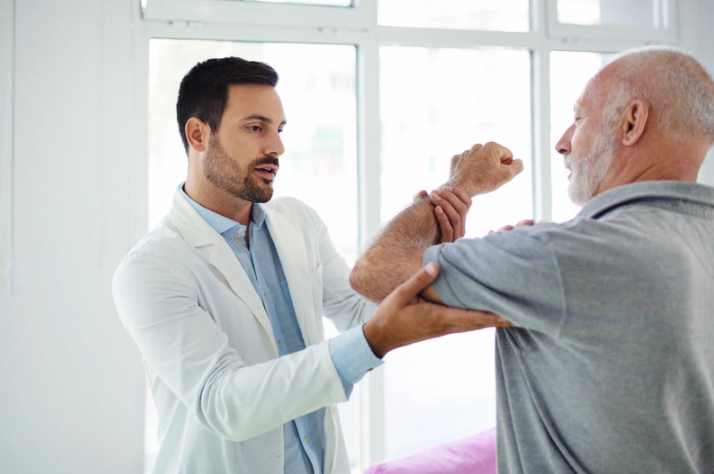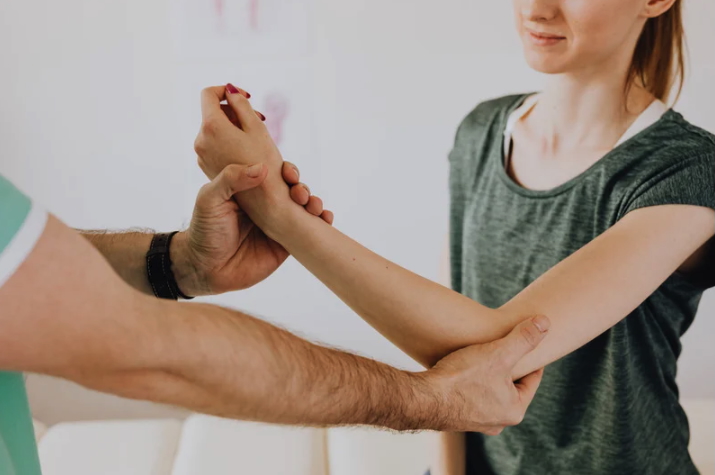
Elbow dislocations don’t happen every day, but when they do, they’re serious injuries that demand the right treatment and careful follow-up.
While shoulder dislocations are more common, elbow dislocations occur more often than many people realize—especially in sports, falls, and accidents.
What makes elbow dislocations unique is that the natural human response after the injury—keeping the joint still—can actually work against recovery. If the elbow stays immobilized for too long, stiffness can set in and in some cases become permanent. Knowing how to respond and what treatment options exist can make all the difference in restoring strength, stability, and range of motion.
This article explains what happens when the elbow dislocates, the difference between simple and complex cases, the risks of stiffness, and how treatment is tailored to protect long-term function.
What Is an Elbow Dislocation?
To understand elbow dislocations, it helps to start with the basics of joint anatomy.
A joint is where two or more bones meet and move against one another. These bone surfaces are lined with smooth cartilage, allowing them to glide in a coordinated, pain-free way. Strong ligaments, tendons, and surrounding soft tissues keep the joint in alignment while allowing motion.
A dislocation occurs when the joint surfaces are forced apart. This is not a subtle event—it typically happens because of a significant injury, such as falling onto an outstretched hand or a traumatic accident. Along with bone displacement, some of the soft tissues around the joint almost always suffer damage.
Simple vs. Complex Elbow Dislocations
Not all elbow dislocations are the same. Orthopedic specialists classify them into two main categories:
- Simple dislocation: The elbow bones separate, but no fractures are present.
- Complex dislocation: The elbow dislocates and there is also a fracture of one or more bones in or around the joint.
Simple dislocations can often be managed without surgery, while complex cases frequently require surgical repair or reconstruction. Complex dislocations are more challenging because the broken bones add another layer of instability and risk.
The Immediate Response: Getting the Elbow Back in Place
When the elbow dislocates, the joint surfaces usually do not return to normal alignment on their own. A trained medical professional must put the joint back into place through a process called reduction.
Because the muscles around the elbow tighten in response to pain, medications or sedation are often needed to relax the patient and allow the reduction to be performed safely.

Once the elbow is back in position, most emergency physicians place the arm in a splint to protect the joint. At this point, many patients assume the hardest part is over—but in reality, the recovery is just beginning.
Why Stiffness Is the Biggest Long-Term Threat
The body’s natural reaction after an elbow dislocation is to keep the arm still to protect it. This instinct makes sense in the short term but can backfire quickly.
If the elbow remains immobilized for too long, scar tissue begins to form inside and around the joint. The result is stiffness—and unlike other injuries, stiffness in the elbow can become permanent.
While a small loss of motion is common even after the best treatment, severe stiffness can affect daily function. Tasks as basic as reaching overhead, eating, dressing, or lifting objects can become difficult. That’s why doctors are extremely cautious about keeping the elbow immobile for too long.
How Long Can the Elbow Stay Immobilized?
The answer depends largely on age. Children can tolerate immobilization for much longer than adults. A child can remain in a splint or cast for up to six weeks without the same risk of permanent stiffness.
Adults, on the other hand, usually cannot afford more than a few weeks of complete immobilization before stiffness sets in. That’s why one of the first steps in orthopedic follow-up care after an elbow dislocation is removing the initial splint and carefully assessing the stability of the joint.
The Doctor’s Role After Reduction
When Dr. Matthew DiPaola evaluates a patient after an elbow dislocation, the immediate priority is to check the joint for stability throughout a range of motion. This evaluation determines whether the elbow can move safely or whether it remains unstable in certain positions.
If instability is present, motion may be limited or controlled using a specialized brace. One common option is a hinged elbow brace. This device, made of plastic and metal, allows the elbow to bend and straighten while restricting unsafe movements. It offers protection while still promoting controlled mobility.
If the joint is stable and X-rays show no associated fractures, the patient may begin a structured therapy program to regain motion. Therapy starts with gentle movements and progresses gradually. Bruising, pain, and soreness are expected in the early phases, since a dislocation is a traumatic event that stresses the surrounding tissues.
When Surgery Is Necessary
Not all elbow dislocations can be managed conservatively. If there is a fracture along with the dislocation (a complex dislocation), the elbow may be too unstable to heal properly without surgery.
Surgical options depend on the type and extent of the injury but may include:
- Repairing or reconstructing torn ligaments
- Fixing fractured bones with plates or screws
- Rebuilding soft tissue structures to restore joint stability
Advanced imaging such as CT scans is often used to map out the injury and guide the treatment plan.
Will the Elbow Dislocate Again?
The risk of recurrent elbow dislocation varies widely from person to person. Factors that influence recurrence include:
- The severity of the original injury
- Whether the dislocation was simple or complex
- The quality of the rehabilitation program
- Future injuries or trauma
Some patients may never experience another dislocation, while others with severe instability may be more prone to repeat episodes. Close follow-up with an orthopedic specialist is key to minimizing risk and protecting long-term joint health.
The Importance of Early, Expert Care
Recovering from an elbow dislocation is not just about getting the joint back into place—it’s about preserving function for the long term. The window for preventing stiffness is short, and the treatment plan must be tailored to the individual’s injury, age, and activity level.
Dr. Matthew DiPaola specializes in complex shoulder and elbow injuries, including both simple and complex elbow dislocations. With more than 20 years of experience, fellowship training, and recognition as a member of the American Shoulder and Elbow Surgeons, Dr. DiPaola combines advanced surgical expertise with patient-centered care.
Whether you are an athlete, a worker who relies on arm strength, or someone injured in a fall, Dr. DiPaola will create a personalized treatment plan designed to restore motion, strength, and stability. His goal is always the same: to help patients return to the activities they love without being limited by stiffness or instability.
Take the Next Step
If you’ve suffered an elbow dislocation, the choices made in the first weeks of recovery can determine your long-term outcome. Don’t leave your elbow health to chance.
Schedule a consultation with Dr. Matthew DiPaola to get a treatment plan built for your unique injury. With offices in Williamsville, Orchard Park, and Niagara Falls, specialized care is close to home for patients across Western New York, northern Pennsylvania, and southern Ontario.
